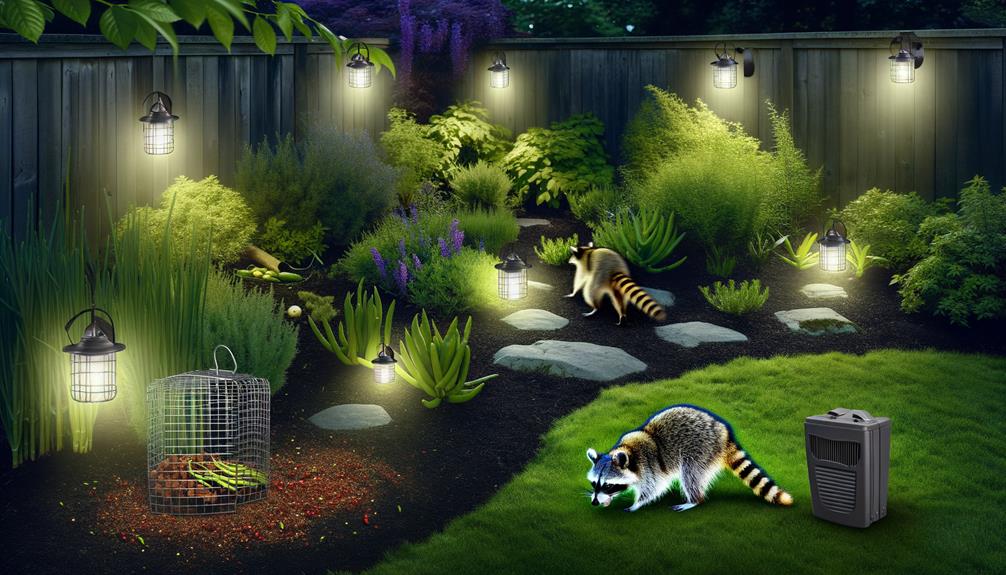Get Rid of Raccoons: Do These 3 Steps for My Garden
To get rid of raccoons in your garden, begin by securing trash cans with lockable lids and promptly removing any potential food sources, including pet food and ripe produce. Install motion-activated lights to create an unpredictable environment.
Employ natural repellents like peppermint oil, cayenne pepper, and predator urine for deterrence. Solid fencing solutions with underground extensions and, if necessary, low-voltage electric fencing can offer additional protection.
For a humane approach, use live traps to capture and relocate raccoons. Should these methods not suffice, consider engaging professional services to guarantee long-term deterrence.
For a more detailed approach, explore further strategies we recommend.

Key Takeaways
- Secure trash cans with raccoon-proof lids and durable materials to prevent easy access.
- Remove potential food sources like pet food, ripe produce, and bird feeders from garden areas.
- Install motion-activated lights with adjustable sensitivity to create an unpredictable environment.
- Use natural repellents such as peppermint oil, cayenne pepper, and predator urine around the garden.
- Consider professional help for comprehensive inspections, humane trapping, and ongoing monitoring.
Understand Raccoon Behavior
Understanding raccoon behavior is essential for developing effective strategies to deter these nocturnal pests from invading your garden. Raccoons are highly intelligent creatures with excellent problem-solving skills. They are primarily nocturnal, foraging for food at night and displaying an omnivorous diet, including fruits, vegetables, and small animals. Additionally, raccoons possess dexterous front paws, enabling them to open containers and manipulate objects with ease.
Recognizing these behavioral traits can guide you in implementing measures that exploit their weaknesses, such as utilizing sensory deterrents and securing potential food sources. By focusing on their nocturnal habits and dietary preferences, you can effectively reduce their attraction to your garden, ensuring a safer and more enjoyable outdoor space for your family and community.
Secure Trash Cans
Guarding your trash cans is vital for deterring raccoons from invading your garden. Opt for trash cans with lockable lids to prevent easy access and make sure they are made from durable materials that cannot be easily chewed through or overturned.
These measures will notably lessen the appeal of your garden as a potential food source for raccoons.
Lockable Lids
One effective strategy for deterring raccoons from rummaging through your garden is to invest in secure trash cans with lockable lids. Raccoons are notorious for their dexterity and intelligence, often able to open conventional trash can lids with ease.
Lockable lids create an additional barrier, preventing these resourceful animals from accessing waste that could attract them to your garden. Opt for trash cans specifically designed with raccoon-proof features, such as heavy-duty locking mechanisms and tight-fitting seals.
This approach not only keeps raccoons at bay but also helps maintain a cleaner, more sanitary environment for your community. By ensuring that trash is securely contained, you contribute to a healthier and more pleasant living space for everyone.
Durable Materials
In addition to lockable lids, selecting trash cans made from durable materials is pivotal to guarantee long-lasting protection against raccoons. Opt for trash cans constructed from heavy-duty plastic or metal, as these materials are less prone to damage and harder for raccoons to gnaw through.
Metal cans, in particular, offer superior resistance to chewing and are less likely to be tipped over. Reinforced hinges and handles are also recommended to prevent raccoons from prying open the lids.
Remove Food Sources
Eliminating accessible food sources is a critical step in deterring raccoons from invading your garden. Raccoons are opportunistic feeders and will readily exploit any available sustenance. To minimize their attraction to your garden, it's fundamental to remove or secure potential food sources.
Here are targeted actions to achieve this:
- Secure Trash Bins: Use raccoon-proof lids and make sure bins are sealed tightly.
- Remove Pet Food: Avoid leaving pet food outside overnight.
- Harvest Ripe Produce: Regularly pick ripe fruits and vegetables to prevent accumulation on the ground.
- Compost Management: Utilize raccoon-proof compost bins or refrain from composting food scraps.
- Bird Feeders: Position bird feeders away from garden areas and use deterrent devices.
Install Motion-Activated Lights
Installing motion-activated lights can effectively deter raccoons by creating an unpredictable and intimidating environment. These nocturnal animals are naturally wary of sudden changes in their surroundings, and the abrupt illumination serves as a significant deterrent.
To maximize effectiveness, strategically place lights in high-traffic areas such as garden entrances, trash bins, and around vegetable patches. Opt for LED lights due to their energy efficiency and longevity. Confirm the sensitivity settings are adjusted to detect raccoons specifically, minimizing false triggers from smaller animals or wind-blown objects.
Regularly maintain and test the lights to guarantee consistent functionality. By incorporating motion-activated lights, you not only safeguard your garden but also contribute to a humane and environmentally friendly method of pest control.
Use Natural Repellents
Utilizing natural repellents can provide an effective and eco-friendly method to discourage raccoons from frequenting your garden. These solutions prioritize the safety of your plants and local wildlife while ensuring that raccoons are deterred.
Consider implementing the following natural repellents:
- Peppermint Oil: Raccoons dislike the strong scent of peppermint. Soaking cotton balls in peppermint oil and placing them around the garden can be effective.
- Cayenne Pepper: Sprinkling cayenne pepper around the garden can act as a natural deterrent due to its pungent aroma.
- Garlic Spray: Preparing a garlic spray and applying it to your plants can deter raccoons without harming vegetation.
- Vinegar: Using vinegar-soaked rags around the garden perimeter can repel raccoons.
- Predator Urine: Applying predator urine, such as from coyotes, can create an environment that raccoons will avoid.
Set Up Physical Barriers
Establishing physical barriers is a crucial and efficient strategy to prevent raccoons from accessing your garden. One of the most reliable methods is installing a sturdy fence around the perimeter. Choose a fence at least four feet high with an outward-angled top to deter climbing. Secure the base by burying it six to twelve inches underground to prevent burrowing.
Additionally, consider using hardware cloth or metal mesh to cover vulnerable areas and protect individual plants. Another efficient barrier is an electric fence, which delivers a mild shock to discourage entry. Check all barriers regularly and maintain them for top effectiveness.
Employ Ultrasonic Devices
Employing ultrasonic devices offers a modern and humane solution to deter raccoons from invading your garden. These devices emit high-frequency sound waves that are irritating to raccoons but inaudible to humans. By installing ultrasonic repellents, you provide an effective, non-lethal method to protect your garden without causing harm to the animals.
Key benefits of ultrasonic devices include:
- Environmentally Friendly: No chemicals or traps involved.
- Ease of Use: Simple installation and maintenance.
- Versatility: Effective against various pests beyond raccoons.
- Continuous Protection: Operate day and night to safeguard your garden.
- Adjustable Settings: Customizable frequencies and ranges for best performance.
Incorporating ultrasonic devices is an efficient and compassionate approach to maintaining a raccoon-free garden.
Create a Predatory Environment
To effectively deter raccoons, creating a predatory environment can be an efficient strategy. Installing motion-activated lights and using predator urine can greatly reduce raccoon activity by instilling a sense of danger.
These methods leverage raccoons' natural instincts to avoid potential threats, making your garden a less attractive target.
Install Motion-Activated Lights
Installing motion-activated lights can effectively deter raccoons by creating a predatory atmosphere, thereby decreasing the likelihood of their presence in your garden. These lights activate upon detecting motion, startling raccoons and making them feel threatened. This approach is humane, eco-friendly, and requires minimal upkeep.
When setting up motion-activated lights, consider the following:
- Placement: Position lights at entry points and areas frequented by raccoons.
- Sensitivity Settings: Adjust the sensitivity to guarantee activation by raccoon-sized creatures.
- Lighting Range: Select lights with a wide detection range for optimal coverage.
- Power Source: Choose solar-powered options to reduce electricity consumption.
- Weather Resistance: Make sure lights are sturdy and weatherproof for year-round effectiveness.
Implementing this plan promotes a safer, raccoon-free garden environment.
Use Predator Urine
Frequently, using predator urine can effectively create an environment that discourages raccoons from intruding in your garden. This method leverages the natural fear raccoons have of their predators, such as coyotes and foxes.
By strategically placing predator urine around the perimeter of your garden, you establish an olfactory boundary that raccoons are hesitant to cross.
It's essential to source high-quality, genuine predator urine from reputable suppliers to guarantee its efficacy. Apply the urine consistently, as environmental factors like rain can lessen its potency.
Although this approach is humane and non-toxic, it is vital to handle and store the product safely.
Install Fencing Solutions
Implementing effective fencing solutions is crucial for preventing raccoons from accessing and causing damage to your garden.
The following measures can be employed to make sure your garden remains a raccoon-free zone:
- Choose the Right Material: Use sturdy materials such as welded wire or hardware cloth, as raccoons can easily tear through flimsy options.
- Adequate Height: Make certain the fence is at least 4 feet high to deter climbing.
- Bury the Fence: Extend the fence 6-12 inches underground to deter raccoons from digging underneath.
- Electric Fencing: Consider low-voltage electric fencing for added security.
- Regular Maintenance: Inspect the fence regularly for gaps or damages and repair them promptly.
Implement Live Traps
While sturdy fencing solutions can deter raccoons to a great extent, employing live traps offers an additional method to manage and remove these persistent intruders from your garden.
Live traps, designed to capture raccoons without harm, provide a humane approach to relocation. For best results, position traps along known raccoon pathways and bait them with enticing food such as marshmallows, peanut butter, or canned fish.
Regularly check traps to guarantee prompt removal, minimizing stress to the animal. Once captured, relocate the raccoon at least ten miles away, ensuring it does not return.
Seek Professional Help
Engaging professional wildlife control services can provide an effective and thorough solution for persistent raccoon problems in your garden. These experts utilize specialized knowledge and equipment to guarantee humane and efficient removal of raccoons, safeguarding both the animals and your property. They also offer tailored advice on preventing future invasions.
Key benefits include:
- Comprehensive Inspections: Identify entry points and assess the extent of the problem.
- Humane Trapping and Relocation: Guarantee raccoons are safely removed without harm.
- Exclusion Techniques: Implement measures to prevent raccoons from returning.
- Damage Repair: Address any damage caused by raccoons to restore your garden.
- Ongoing Monitoring: Provide follow-up services to guarantee long-term protection.
This professional approach ensures your garden remains a safe and enjoyable space.
Conclusion
To sum up, effectively managing raccoon presence in a garden requires a thorough approach. By understanding their behavior, securing trash cans, and removing food sources, a significant reduction in raccoon activity can be achieved.
Installing motion-activated lights, using natural repellents, and creating a predatory environment further enhance deterrence. For instance, just as a fortress employs multiple layers of defense, implementing fencing solutions and live traps fortifies the garden against persistent intruders.
Professional assistance may be necessary for severe infestations.






